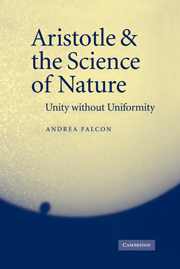2 - Bodies
Published online by Cambridge University Press: 22 September 2009
Summary
BODIES AND MAGNITUDES
The science of nature is clearly concerned for the most part with bodies and magnitudes, the affections and motions of these, and the principles of this kind of substance
(Aristotle, DC 268 a 1–6).By this point I hope to have established that Aristotle sees his science of nature as a systematic whole. It should also be clear that this science is seen as a systematic whole because it presents an account of a world that is similarly systematic. More directly, and more boldly, the science of nature mirrors the system of nature. Aristotle's conception of the natural world follows from the research program conducted in the science of nature. In other words, it is the study of the celestial and sublunary bodies that leads him to believe that the natural world is a causal arrangement of a certain type, and to the view that the study of the celestial world should precede, rather than follow, the study of the sublunary world. In the first two books of the DC are collected the results that Aristotle reached in the study of the celestial world. In the following chapters, I shall focus on specific parts of the DC and show how unusual Aristotle's conception of the celestial word is, especially if it is considered in its historical context in relation to his predecessors and successors.
- Type
- Chapter
- Information
- Aristotle and the Science of NatureUnity without Uniformity, pp. 31 - 54Publisher: Cambridge University PressPrint publication year: 2005



